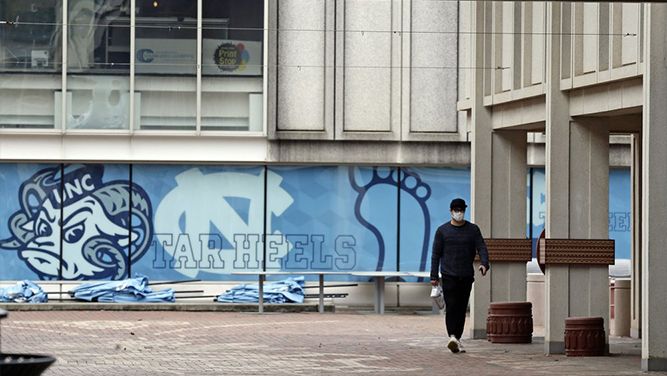Undergraduate classes at the University of North Carolina at Chapel Hill will move to all-online as the number of coronavirus cases grows just weeks after students arrived on campus.
University administrators made the announcement Monday afternoon. Many UNC classes were already online, but as of Wednesday, all undergrad classes will go virtual, the university said.
The university has reported four coronavirus case clusters among students in recent days.
The school did not tell students they had to move out, but in an email to students, administrators said, "We expect the majority of our current undergraduate residential students to change their residential plans for the fall."
“Since launching the Roadmap for Fall 2020, we have emphasized that if we were faced with the need to change plans – take an off-ramp – we would not hesitate to do so, but we have not taken this decision lightly,” Chancellor Kevin Guskiewicz told students.
School administrators said the case positivity rate have jumped from 2.8% to 13.6% at the student health center.
"As of this morning, we have tested 954 students and have 177 in isolation and 349 in quarantine, both on and off campus. So far, we have been fortunate that most students who have tested positive have demonstrated mild symptoms," administrators said.
“There are no easy answers as the nation navigates through the pandemic. At this point we haven’t received any information that would lead to similar modifications at any of our other universities. Whether at Chapel Hill or another institution, students must continue to wear facial coverings and maintain social distancing, as their personal responsibility, particularly in off-campus settings, is critical to the success of this semester and to protect public health,” UNC System President Peter Hans said in the letter.
UNC administration and the Board of Governors that oversees the entire system have come under fire from staff and faculty for reopening to students during the coronavirus pandemic.
Staff and faculty filed a class-action lawsuit against the system last week for reopening without a plan to keep employees safe.
UNC adminsitrators made the announcement shortly before an emergency faculty meeting planned for 4 p.m. Monday.
In a separate statement, the UNC System president said, "The decision to adapt operations applies to UNC-Chapel Hill only because no other UNC System institution has reported information, at this time, that would lead to similar modifications."
Hans said students at other public universities in North Carolina will have to wear masks and physically distance, especially when off campus. Reports and photos have been circulating from several universities of students throwing parties and gathering in groups without taking coronavirus precautions.
"Each campus is different, and I expect situations to evolve differently. In any circumstance, we will be grounded by reliable public health data and prevailing local health conditions. I will continue to stay in close contact with our chancellors and fully support their efforts to fulfill our core educational mission in safe learning environments,” Hans said.
Jay Smith, a history professor at UNC Chapel Hill, told Spectrum News, "Great relief was the initial impression."
But, he said, "It shouldn't have taken so many infections."
"It was very frustrating that it took this much hard evidence" to move classes online, Smith said. "This was the most predictable disaster in the history of disasters."
Sherryl Kleinman, who has lived in Chapel Hill for 40 years and taught sociology at the university for 38, told Spectrum News 1, "The UNC-CH plan falls far short of what is needed. The University cannot control the density of fraternity or sorority houses, those living in apartments in Chapel Hill and Carrboro, and not even in dorms on campus."
She said she hoped university administrators would work with other campuses in the UNC System to return to all online classes and close on-campus student housing.
North Carolina remains in Phase 2 of Gov. Roy Cooper's reopening plan. New coronavirus cases around the state have been trending downward, but there are still almost 1,000 people hospitalized with the virus in the state as of Monday.





